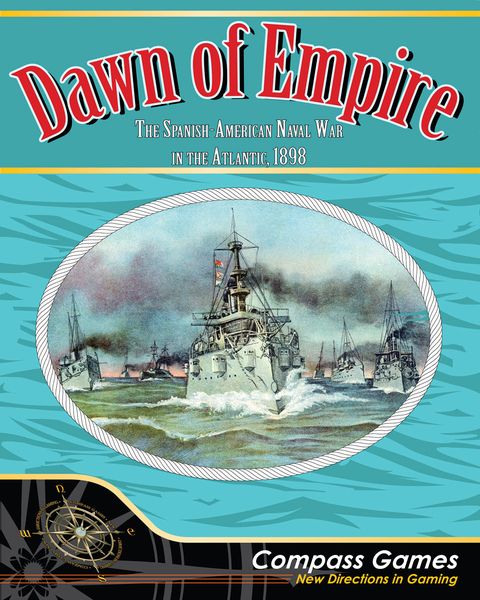Dawn of Empire: The Spanish American Naval War in the Atlantic, 1898 (2020) Board Game
Brief History and Background Information for Dawn of Empire: The Spanish American Naval War in the Atlantic, 1898
Dawn of Empire: The Spanish American Naval War in the Atlantic, 1898 is a historical wargame that simulates the naval conflicts between the United States and Spain during the Spanish-American War of 1898. Players take on the roles of naval commanders, strategizing and maneuvering their fleets to gain control of key areas in the Atlantic Ocean.
Game Components of Dawn of Empire: The Spanish American Naval War in the Atlantic, 1898
- Game board depicting the Atlantic Ocean
- Ship counters representing the fleets of both the United States and Spain
- Dice for resolving combat and movement
- Rulebook with detailed instructions
How To Setup Dawn of Empire: The Spanish American Naval War in the Atlantic, 1898
- Place the game board in the center of the table.
- Separate the ship counters by faction.
- Each player takes control of either the United States or Spain.
- Place the ship counters on their starting positions.
- Roll to determine who goes first.
Gameplay Mechanics and Game Objective
The objective of Dawn of Empire is to strategically position your fleet and engage in combat to control key areas on the game board. Players must use their ships’ movement abilities and dice rolling skills to outmaneuver and defeat their opponent’s fleet.
Player Experience
Pros
- Engaging historical theme
- Strategic depth in maneuvering ships
- Intense combat resolution through dice rolling
Cons
- Steep learning curve for new players
- Limited replayability due to fixed scenarios
Personal Thoughts on Dawn of Empire: The Spanish American Naval War in the Atlantic, 1898
Dawn of Empire offers a unique and immersive experience for players interested in naval warfare history. The game’s components are well-made, and the artwork captures the essence of the time period. However, the game may not appeal to casual gamers due to its complexity and lengthy gameplay. It is best suited for players who enjoy deep strategy and historical accuracy in their board games.
In terms of pricing and availability, Dawn of Empire can be on the higher end of the spectrum for board games. It is recommended for collectors or history buffs who are willing to invest in a quality wargame experience. Alternatives to Dawn of Empire include other historical wargames like Axis & Allies or Twilight Struggle. Overall, Dawn of Empire is worth your time if you are a fan of naval warfare history and enjoy challenging strategic gameplay. However, casual gamers or those looking for a quick and light board game experience may want to skip this one.
Game Components of Dawn of Empire: The Spanish American Naval War in the Atlantic, 1898
How To Setup Dawn of Empire: The Spanish American Naval War in the Atlantic, 1898
Setup involves each player deploying their naval resources onto the map, representing the Atlantic Ocean and Caribbean Sea. The United States player aims to control sea areas around the U.S. Atlantic coast and the Caribbean, while the Spanish player seeks to disrupt this control and maintain sea control around Spanish coastlines. Players place their warships in designated sea areas, ensuring they are aligned with their strategic objectives.
Gameplay Mechanics and Game Objective
– Area Movement: Players move their warships within defined sea areas.
– Dice Rolling: Used for resolving combat and other strategic decisions.
– Simulation: The game simulates the strategic naval aspects of the Spanish-American War.
Player Experience
**Dawn of Empire** offers a strategic and relatively straightforward gameplay experience. The game is designed to provide a broad overview of the historical events surrounding the Spanish-American War, focusing on naval conflicts. It balances complexity with ease of play, making it accessible to those interested in historical wargames without being overly intricate.
Pros
Cons
Personal Thoughts on Dawn of Empire: The Spanish American Naval War in the Atlantic, 1898
This game is ideal for enthusiasts of historical wargames and those interested in the naval aspects of the Spanish-American War. It offers a engaging and educational experience, making it a great addition to any collection focused on strategic and historical gameplay. However, it may not be the best fit for solo players or those seeking games with more intricate mechanics.
We are supported by our audience. When you purchase through links on our site, we may earn an affiliate commission, at no extra cost for you. Learn more.

